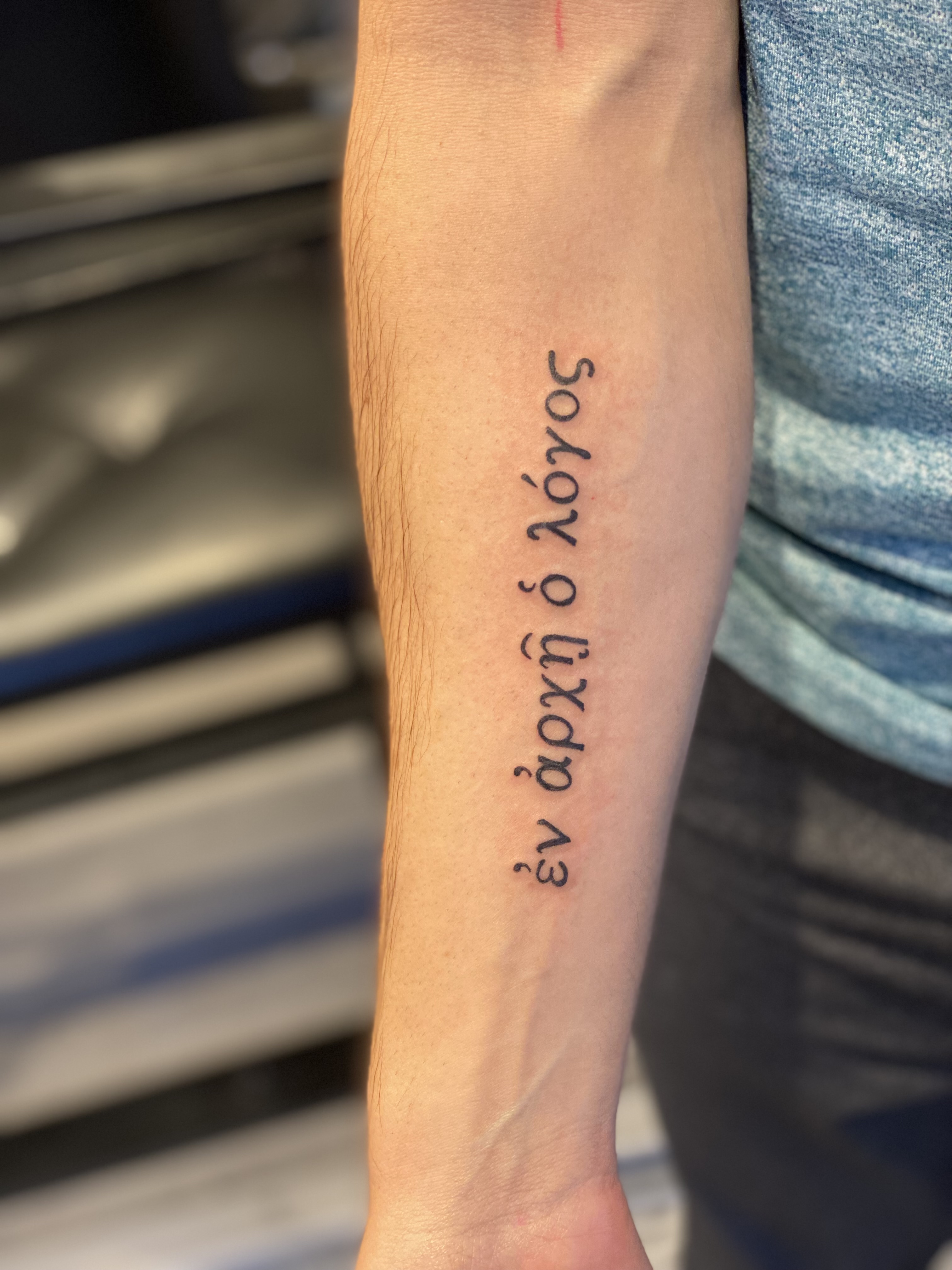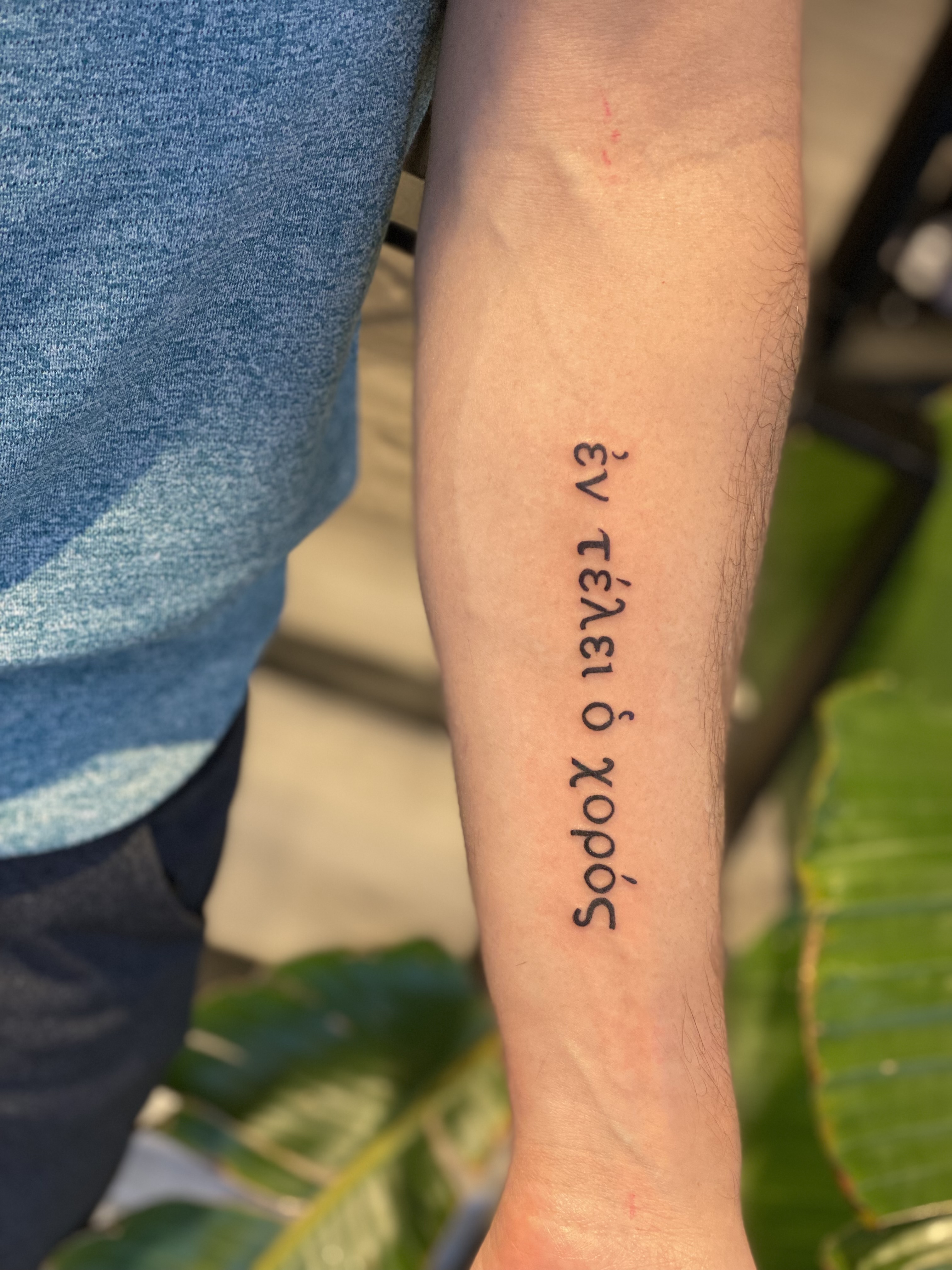Today I received my first set of tattoos.1 It took me many years to come up with something that I felt was meaningful enough to make a permanent part of my external appearance. Ultimately, I was able to develop a short poem in Koine Greek that hit the mark for me. What follows is a sort of theological meditation on the text and the meaning of these tattoos.
The text in Greek:2
ἐν ἀρχῇ ὁ λόγος ἐν τέλει ὁ χορός
And translated into English:
In the beginning [was] the Word In the end [will be] the Chorus
John the Theologian makes an astonishing claim in the first sentence of his Gospel about the primacy of the ontology of the “Word” (including in its semantic constellation categories like Relation, Story, or Reason): it is coeval with God, in fact it is coextensive with God. Even more astonishing, several sentences later, he makes the claim that this primal category of existence became human flesh—became one of us, in all the important ways that make you you and me me.
The prophet Isaiah declares that the Word of God shall not return void, and trinitarian theology sees this fact as part of the very fabric of reality: the Word proceeds from the Father (as the Son) so as to save, collect, and preserve all of Creation, returning it to its Creator in a joyful reunion. A word that is spoken into nothingness is of no value, for soliloquy is the domain of solipsism. A word that is spoken to a featureless surface and bounces back as a mere echo is similarly void, however resounding. But a Word that is caught by its hearers, that effects change, and that elicits a conversation in response—that is the Word which does not return void.
And so, in almost syllogistic (literally, “together-with-the-word”) fashion, we realize that the point of the Word is to produce many other words in response. The point of the Son is to bring all of Creation into the relation of restored childhood with the Father. The point of the first Word spoken in the darkness is to create the the light necessary for life. And the point of the Word spoken into human flesh is to enable all flesh to speak to God. But do we imagine a cacophony of voices shouting unintelligibly? No! The proper mode of diverse oral unity is not speaking (which can ultimately only mean speaking over one another) but singing, together. Only in singing are words from multiple parties joined temporally in mutual respect and harmony. They blend, creating something new and better without loss of person or agency. Therefore, the proper auditory image is not the atonal conversation of a debate, but rather antiphony, call-and-response, the bid of the lover and the reply of the beloved. First the Word, then the Chorus. When the Chorus joins the Word, the distinctions between the two matter less than they did before. When humankind joins the Son as children of God, the Son becomes “merely” the eldest brother, the first-born of a new kind of creature. The Word lassos and lifts; it does not return void. It grants existence without being made less itself. The relationship between God and Creation is anything but zero-sum.
The existence of God as Word shows us God as yearning, more than anything else, to be joined in song by other words, by we who have heard the first Word and who have chosen to sing in reply through the patterning of our lives. Each voice that answers the Word in song has its own character, its own timbre, its own language, and these differences are not erased when joined in the mighty chorus with others; rather, they meld into something impossible, individual yet corporate, the distinction between sum and parts having become a category error. The ineffable movement and infinite song of Dante’s comic apex is captured in the χορός, because this word in Greek is the root not only of “chorus” but of “choreography”. When we respond to the Word we do not do so with verbal statements, but with our singing voices and our moving bodies, the inscribers upon physical reality of the Word’s work upon our hearts.
The fact that “Word” is the primary ontological category, not just in the sense of time but also in the sense of preeminence, implies that “Chorus” (known variously as theosis, the beatific vision, and so on) is the primary teleological category, not just in the sense of time but also in the sense of purpose. The Word that spoke the universe into being also apparently spoke Aramaic, through trachea and tongue, creating pressure waves of sound, which reverberated eventually, with many twists and turns, into my ears, transformed but retaining their essence. The choice that remained for me was merely whether to join the Chorus or to remain silent. And in a way it was never really a choice, because whatever else I am, I am a musician. I will always choose the song, the “yes”, over the silence of the void.
Notes
- The tattoo was inked by Jessica Puska; very happy with her work!
- Many thanks to Seumas Macdonald who helped to ensure the Greek was sensible and correct.


1 reply on “A theological reflection on my first tattoos”
Pretty sure this ought to be your next permanent mark on the body…
https://youtu.be/HmF0RqazR_8?t=37
Beautiful words. Well chosen. And, not unimportant, it looks very nice.